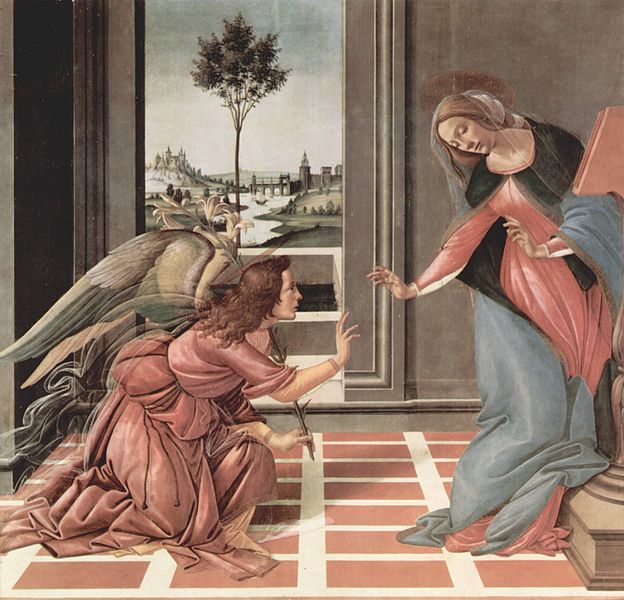
Annunciation (1489-1490), by Sandro Botticelli (1445-1510) [public domain / Wikimedia Commons]
*****
The following is drawn from the book, Following Zwingli: Applying the Past in Reformation Zurich, edited by Luca Baschera, Bruce Gordon, and Christian Moser (Burlington, Vermont: Ashgate Publishing Co., 2014), and its chapter 6: “Reforming a Model: Zwingli, Bullinger, and the Virgin Mary in Sixteenth-century Zurich,” by Rebecca A. Giselbrecht (pp. 137-174). She is a PhD student at Fuller Theological Seminary.
The data that Giselbrecht presents demonstrates that Protestant Reformed Mariology was quite full and robust in the Catholic sense in “reformer” Huldrych Zwingli‘s time in Zurich (1518-1531), and also in his successor, Heinrich Bullinger‘s time (1531-1575), becoming gradually less robust, but still significantly greater than in most of today’s Protestantism. The intercession of Mary and invoking her (and any sense of her being a mediator of grace besides her bearing of Jesus) were particularly frowned upon early on (as in Luther). Other beliefs, such as referring to her as the Mother of God and her perpetual virginity and sublime, singular sanctity, were almost fully, if not fully retained.
Zwingli’s words will be in green, Bullinger’s in blue. The rest will be from Rebecca A. Giselbrecht, excepting my bracketed interjections.
*****
[In 1523] Zwingli perceived the necessity of keeping Mary’s virginitas in partu [during childbirth; i.e., an intact hymen] and even virginitas post partum as doctrine . . . (p. 143)
[Zwingli’s sermon, On the Eternally Pure Virgin Mary, 1522; see an English translation of the entire sermon] . . . Mary retained her virginity forever . . . Mary is to be praised above all people, and especially above all women. (p. 147)
I am satisfied that I have presented my clear opinion of the Mother of God . . . I totally believe that she remained a pure virgin. I absolutely believe that God elevated her above all other creatures, the blessed, and the angels, into eternal joy. (p. 150)
Zwingli went beyond his own principle by allowing the celebration of Mary’s assumption to continue being celebrated with a Feast Day in the church. (p. 152)
[Zwingli, 1529] [One can use the] Ave Maria [as praise] in order to salute and laud Mary. (p. 152)
[The Hail Mary remained in services in Zurich up till 1563] (p. 152)
[Bullinger’s sermon, The Blessed Virgin Mary, 1557] . . . she remained a virgin. . . . the eternally virgin Mary. (pp. 154, 158)
Bullinger leans on Eusebius, contending that the Virgin Mary, the mother of Jesus Christ, was taken up to her son in heaven . . . (p. 162)
[Eusebius of Caesarea had written: “The virgin Mary, mother of Jesus Christ, is taken up to her son in heaven.”]
It should be enough for us to believe and to confess that the Virgin Mary, the beloved mother of our Lord Jesus Christ has been sanctified through the grace and blood of her own son and through the gift of the Holy Spirit has been richly gifted above all women, and finally as it is with angels, lives in heaven, who is declared truly blessed by all people, now lives happily with Christ in heaven; and that she is named the Eternal Virgin and also is and remains so, that is, the bearer of God, whose memorial should be celebrated in the church always and festively, that is piously and not superstitiously. (p. 162)
The reformer insists that Mary is, in fact, ‘full of grace’ . . . (p. 163)
She has special favor and grace with God and received the most and largest gift of grace from God, and that is why she is the most pleasing and beloved to God of all . . . (p. 164)
We do not claim that Mary should not be venerated . . . as the true Mother of God, the Blessed Virgin among all women, the eternal virgin. (p. 165)
*****
Meta Description: Interesting facts about the robust Mariology of the Zurich Protestant “reformers” Zwingli and Bullinger.
Meta Keywords: Zwingli & Mariology, History of Doctrine, Bullinger & Mariology, Protestant Mariology













